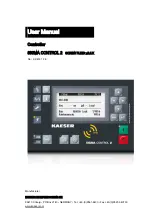
A - 12 A - 12
The Manual's Use and Structure
How to use this manual
In this manual, explanations are given for each special function of the Ethernet
modules (QJ71E71-100, QJ71E71-B5 and QJ71E71-B2). Please use this manual
using the following key items below as a reference.
(1) To learn about an overview of the special functions
• Chapter 1 provides an overview of each of the special functions available for
the Ethernet modules.
(2) To use the e-mail transmission/reception function and the PLC
CPU monitoring function
• Section 2.2 describes the environment in which e-mails can be used.
• Section 2.6 illustrates the screens for parameter settings using GX Developer
in order to use the e-mail function.
• Section 2.9 describes the parameter settings in order to monitor the status of
the PLC CPU.
(3) To communicate with PLC CPUs of other stations via the
MELSECNET/H, MELSECNET/10 and Ethernet module
• Section 3.2 describes the accessible range and accessible stations when
accessing other stations via the Ethernet modules.
• Section 3.3 describes the parameter settings using GX Developer in order to
perform data communication with the PLC CPUs of other stations.
• Section 3.3.2 provides an overview of the processing for Station No. <-> IP
information conversion.
(4) To use the file transfer (FTP) function
• Section 5.3 describes the parameter settings using GX Developer in order to
perform the file transfer.
• Section 5.6 describes the FTP operation command on the FTP client (external
device) side that is supported by the Ethernet module.
POINT
To know about the following items, see the Ethernet Interface Module User's
Manual (Basic).
(1) Detailed descriptions of the error codes
Chapter 11 describes troubleshooting, how to check for errors, and detailed
descriptions of error codes for the Ethernet modules.
(2) Storage locations of the error codes for the Ethernet module
Section 11.3 lists the error code storage locations in the buffer memory in the
beginning of the section.















































